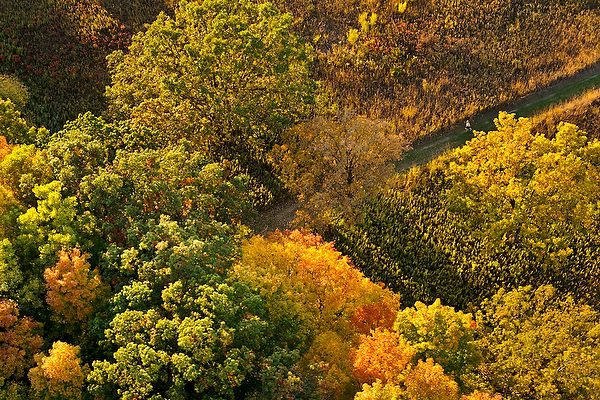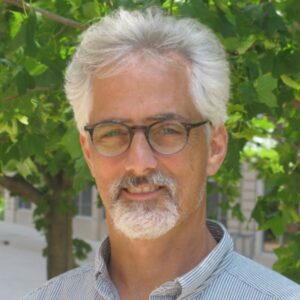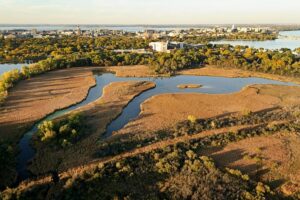
Most of us experience nature to some degree, whether climbing a mountain or shoveling the driveway during a Wisconsin winter, but what does it mean to truly know our natural surroundings? Two upcoming Continuing Studies courses explore this question with help from Wisconsinite Aldo Leopold, the famed writer, ecologist, and father of the environmental movement. Both courses are part of a Leopold-themed series.

Leopold’s land ethic, a way of thinking about relationships between living things and their habitats, helps Marian Farrior talk about community in the eight-week course Discovering Patterns in Nature (Feb. 24-April 28).
“One of the most brilliant things Leopold did is help us remember that trees, soil, and animals are our community members,” she says. “The land ethic reminds us that we have a responsibility to care for our community members, whether they’re prairies, wetlands, oak savannas, or other people.”
An environmental educator and sustainable systems expert from the UW-Madison Arboretum, Farrior introduces students to forms and patterns found throughout the natural world, including spheres, spirals, and waves. Learners also take part in creative projects that examine this intersection of math, science, and art. In addition to sketching examples of nature’s favorite patterns, learners spend part of each class making something they can take home and share with friends, loved ones, or Mother Earth herself. For instance, one class features the construction of seed balls, spheres of clay, seeds, and other biodegradable materials that sprout seedlings when tossed into habitats where plants can grow.
Though Farrior has spent more than 15 years doing ecological restoration at the Arboretum, teaching courses like Discovering Patterns has brought a new layer of meaning to her work.
“Learning about nature’s patterns is a spiritual practice for me,” she explains. “I’ve developed a deeper appreciation of the incredible beauty that exists in the world, and also the interrelatedness of living things. We don’t necessarily see these relationships in our day-to-day lives, but we can discover how to slow down, observe them, and learn from them.”
The land ethic in action

Leopold’s focus on relationships in nature also informs Christopher Chambers’ Writing Nature: Signatures in the Wild (March 1-22), a four-week course that explores how writing about nature affects humans’ sense of place. Learners read and discuss short selections by Gary Snyder, Anne Carson, Wendell Berry, and others, and then do some nature writing of their own using these works as models and inspiration. The wild beauty of the course’s Arboretum location provides additional inspiration, according to Chambers, an accomplished writer who has received a National Endowment for the Arts fellowship, four Pushcart Prize nominations, and other honors for his fiction, nonfiction, poetry, and screenwriting.
“An important part of writing is awareness of the world, so setting matters,” he says. “Nature writing is usually written in the first person and often requires us each to go out on our own and explore the world using our own five senses.”
In addition to taking short nature-discovery excursions in the Arboretum, Writing Nature students weave their thoughts and observations into a choice of written genres, including poetry, fiction, and nonfiction. Chambers stresses that no writing experience is necessary for this course, and that it is a good fit for anyone interested in reading, creating, and exploring nature. He also suggests taking the course now since it’s an ideal time to view current events through an environmental lens.
“Leopold’s land ethic—an ethical, caring relationship between people and nature—is all the more important given the current climate, political and meteorological,” he says. “I’m excited to be part of a series that honors Leopold’s contributions and continues his work as a conservationist, forester, philosopher, educator, and writer.”
For more information, contact Jessica Courtier, jessica.courtier@wisc.edu, 608-890-3626.